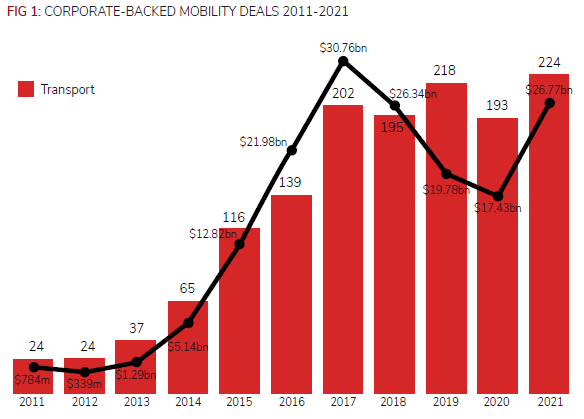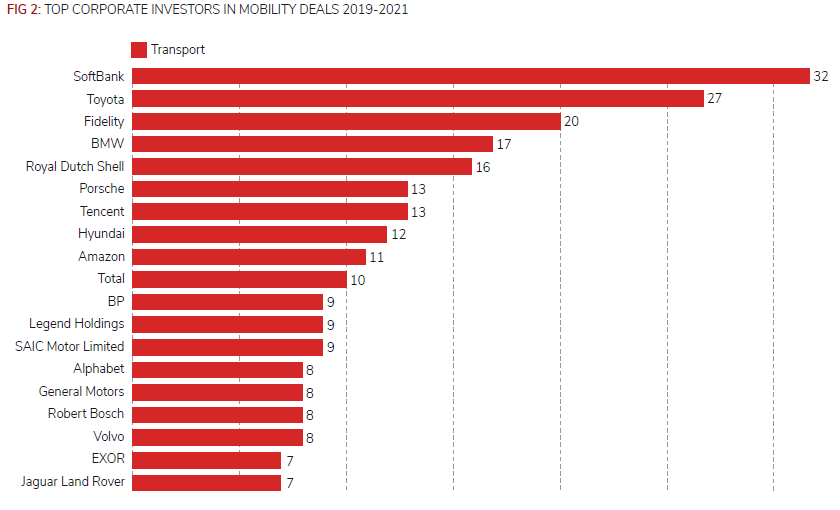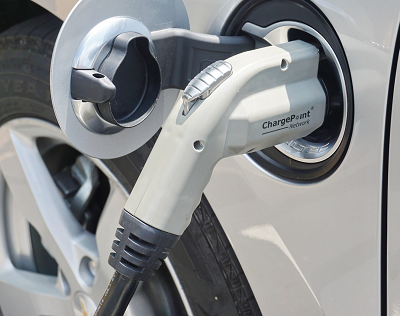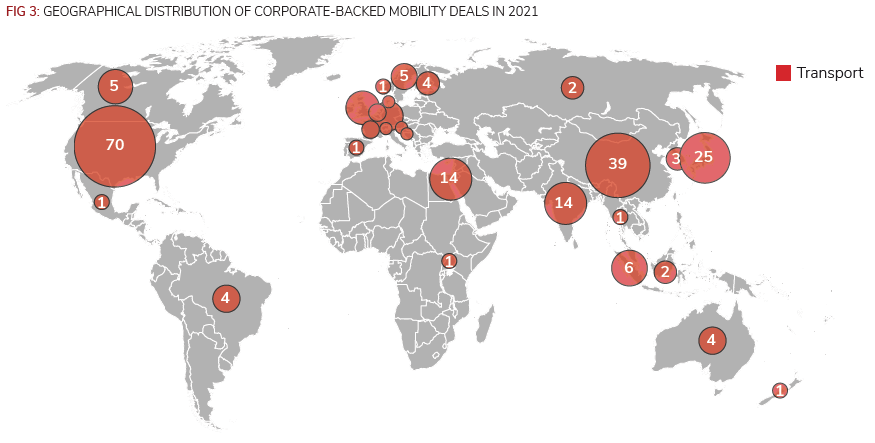The mobility sector has been flourishing in the past few years with the development of ground-breaking technologies in the electrification, autonomous vehicles and connectivity segments reshaping the entire industry.
The global transportation and mobility market is expected to reach $7.8 trillion by 2027, growing at a CAGR of 3.4%, according to data from ReportLinker.
“Pre-2010, the mobility industry had a very stable set of suppliers, was very predictable and not particularly prone to disruption,” said Jim Adler, founding managing director of Toyota Ventures. “This has radically changed in the past decade. The sector has fostered a wide range of innovative technologies, becoming an incredibly vibrant space, rich in promising investment opportunities.”
The need to adopt more sustainable means of transport and the goal of reaching net zero emissions pursued by most mobility corporations represent one of the strongest drivers behind this growth.
The transportation industry is responsible for 24% of direct CO2 emissions from fuel combustion, according to data from the International Energy Agency (IEA). Road vehicles account for nearly three quarters of transport greenhouse gas emissions and pollution from aviation and shipping has more than doubled over the past two decades.
Cleaner future
Several startups have emerged in the mobility industry promoting innovative solutions for a cleaner future and have attracted an increasing amount of capital from a large pool of investors, including numerous corporations.
In 2019, 218 corporate-financed deals were inked worldwide, worth a total of $19.8bn. Following the spread of the coronavirus pandemic, activity decreased slightly in 2020 and the sector recorded 193 corporate-sponsored deals for an aggregate value of $17.4bn.
However, the mobility industry has experienced a strong rebound since the beginning of 2021 and has been growing at a fast pace in the past few months, attracting a large amount of capital from corporate venture units. In the first 11 months of the year, there were 224 corporate-backed deals worth an aggregate value of almost $27bn – already well above pre-pandemic levels.
North America is the region that has recorded the highest number of corporate-financed rounds in 2021, with 70 deals in the US and 5 in Canada. Asia has also seen an increasing number of mobility deals sponsored by corporations: 39 rounds were closed in China and 25 in Japan in the first 11 months of the year.
Japanese telecommunication group SoftBank, automotive manufacturers Toyota and BMW, and financial services group Fidelity have been the top corporate investors in the mobility sector in the past two years.
New funds
To seize the opportunities offered by the sector, several mobility corporations have launched new funds this year, including carmaker Volkswagen, which announced plans to raise a $355m venture capital fund to invest in decarbonisation startups. Meanwhile, BMW’s corporate venturing arm BMW i Ventures launched a $300m vehicle with a strong focus on sustainability across the transportation, manufacturing and supply chain industries and Toyota announced a $150m fund in June to back early-stage companies around the world that are working on innovation in carbon neutrality.
“Our Climate Fund focuses on startups that are developing innovative technologies aimed at decarbonising the mobility industry and helping us achieve carbon neutrality goals, including EV, carbon capture and storage, renewable energy and hydrogen,” said Toyota Ventures’ Adler.

Electric Attraction
driven by the electric vehicles (EV) segment, which has been booming and is expected to further expand in the next decade.
Data from Market Research Future show that the vehicle electrification market is projected to be worth $145bn by 2027, growing at a CAGR of 12.5%.
Electric car registrations increased by 41% in 2020 despite the pandemic, with 10 million EV vehicles on the world’s roads at the end of the year, according to the IEA. Around three million electric cars were sold globally last year, with Europe overtaking China as the world’s largest electric vehicle market for the first time.

This trend has been supported by the growth of the renewable energy sector over the past decade, which has provided clean energy at lower costs and by the reduction in expenses for the production and maintenance of electric powertrains, thus resulting in decreased costs of ownership for electric vehicles.
However, developing high-performing EVs powered by batteries that can compete with combustion engines presents several challenges and a number of safety concerns, including the possibility of a thermal runaway, which happens when the battery cell’s temperature rises and the energy stored is suddenly released causing a fire.
One of the most promising technologies that could solve some of these issues is the solid-state battery, which has the potential to improve the features and address most of the safety concerns with present-day lithium-ion batteries.
Among the companies that are developing this technology is Solid Power, a US-based startup that, in March 2021, received funding from BMW and Ford in a $130m series B round. A couple of months later, the company announced its intention to go public on the Nasdaq by merging with a SPAC, in a deal valuing the combined entity at around $1.2bn.

“Solid Power is developing the next generation of batteries with solid-state electrolytes, a technology that will significantly improve battery capacity and, first and foremost, will make our batteries much safer,” said Marcus Behrendt, CEO of BMW i Ventures. “Solid-state batteries are able to guarantee a much higher degree of thermal stability, avoiding the development of thermal runaways.”
Adoption Barriers
In addition to battery safety concerns, other issues faced by EVs pertain to their long recharging time and relatively short driving range.
One company that is working on achieving a range extension for energy storage solutions is Our Next Energy. One of its products, Gemini, uses a dual-battery range extender architecture, allowing EVs to travel more than 750 miles on a single charge.
The company raised a $25m series A round this year, led by Breakthrough Energy Ventures and backed by BMW i Ventures and electronics manufacturer Flex.

“Electric cars are currently only able to deliver ranges that are on the lower end of combustion engines,” said BMW i Ventures’ Behrendt. “Our Next Energy has developed devices that, by using two batteries and AI-powered technology, are capable of maximising each battery’s range and distributing power between them, thus optimising performance storage and energy extension.”
Despite the recent expansion in infrastructure, with a growing network of charging stations being installed globally, charging availability remains another big concern that could undermine the widespread adoption of EVs.
“Even if a portion of electric charging could take place at home or in the workplace, for most drivers, finding an easily accessible charging point on the streets will remain crucial,” said Behrendt. “Developing an accessible and convenient infrastructure is essential to supporting EV growth in the coming years.”
Several startups have focused on developing an efficient EV charging network, including ChargePoint, a US-based company backed by BMW i Ventures, Daimler and Siemens that listed on the Nasdaq last year in a $2.4bn reverse merger.

“Companies such as ChargePoint are really driving the market,” said Behrendt. “It was an early developer of innovative technologies designed to build a charging infrastructure for the industry. Its network includes public charging stations, consumer subscription plans and grid management services for electric utility companies to smooth electric demand upon the grid.”
Other startups have tried to disrupt the mobility industry by creating an entirely new type of transportation that could reshape consumers’ habits and their approach to mobility. One such example is Joby Aviation, an air taxi company that has developed an all-electric, vertical take-off and landing passenger aircraft.
The business, which is backed by Toyota Ventures, JetBlue Technology Ventures and Intel Capital, went public on the New York Stock Exchange last August in a reverse merger with a SPAC, reaching a post-transaction valuation of $4.5bn, one of the highest in the sector.

“Joby has developed a safer, quieter, cleaner and more efficient means of transport that combines the ease of conventional ridesharing with the speed of flight,” said Toyota Ventures’ Adler. “Technologies like Joby’s, that are innovative, safe and convenient, can truly disrupt the mobility sector and deliver a cleaner future.”
Taking a glance at the coming years, the barriers to EV adoption are shrinking and the outlook for the sector appears very positive. Thanks to rapid technological advancements and product development from automakers, costs of ownership are rapidly decreasing. At the same time, governments around the globe are introducing regulations, subsidies and incentives to accelerate the shift to sustainable mobility.
Resistance is futile
Furthermore, a change in sentiment, accelerated by climate change concerns, has helped the mobility market to overcome initial consumer resistance and pave the way to a broader adoption of EVs.
Despite these important improvements, the electrification of other segments of the transportation industry – such as aviation and shipping – remains very challenging and will require a more concerted effort to achieve a substantial reduction of carbon emissions.

“Passenger cars have already achieved great performance and will further improve thanks to the innovative technologies that are being developed across the electrification industry,” said BMW i Ventures’ Behrendt. “By 2030, we will see a considerable increase in EVs around the globe.
However, the path to electrification is much more challenging and complex for other types of vehicles and other segments of the transportation industry, such as heavy trucks, cargo ships and aviation. For those, biofuels and hydrogen might represent a more feasible solution, at least in the short and medium term, with our current technological knowledge. This does not mean that electrification cannot happen for those vehicles, but it will be an arduous challenge to overcome.”
